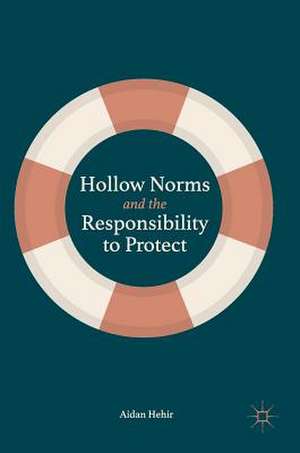Hollow Norms and the Responsibility to Protect
Autor Aidan Hehiren Limba Engleză Hardback – 26 iun 2018
| Toate formatele și edițiile | Preț | Express |
|---|---|---|
| Paperback (1) | 384.31 lei 6-8 săpt. | |
| Springer International Publishing – 10 ian 2019 | 384.31 lei 6-8 săpt. | |
| Hardback (1) | 501.39 lei 6-8 săpt. | |
| Springer International Publishing – 26 iun 2018 | 501.39 lei 6-8 săpt. |
Preț: 501.39 lei
Preț vechi: 589.87 lei
-15% Nou
Puncte Express: 752
Preț estimativ în valută:
95.96€ • 99.42$ • 80.08£
95.96€ • 99.42$ • 80.08£
Carte tipărită la comandă
Livrare economică 22 martie-05 aprilie
Preluare comenzi: 021 569.72.76
Specificații
ISBN-13: 9783319905358
ISBN-10: 331990535X
Pagini: 257
Ilustrații: XIII, 257 p.
Dimensiuni: 148 x 210 x 23 mm
Greutate: 0.48 kg
Ediția:1st ed. 2019
Editura: Springer International Publishing
Colecția Palgrave Macmillan
Locul publicării:Cham, Switzerland
ISBN-10: 331990535X
Pagini: 257
Ilustrații: XIII, 257 p.
Dimensiuni: 148 x 210 x 23 mm
Greutate: 0.48 kg
Ediția:1st ed. 2019
Editura: Springer International Publishing
Colecția Palgrave Macmillan
Locul publicării:Cham, Switzerland
Cuprins
1. Chapter 1/Introduction: ‘R2P has begun to change the world’.- 2. Chapter 2: The Rise of R2P and the Fall of Human Rights.- 3. Chapter 3: R2P and the Limits of Norms.- 4. Chapter 4: Sovereignty as Authority: State Support for R2P.- 5. Chapter 5: Sovereignty as Liability: The Security Council and R2P.- 6. Chapter 6: Norms and Mass Atrocities.- 7. Chapter 7: Critics or Courtiers?: R2P and the Status Quo.- 8. Chapter 8/Conclusion: After Failure
Recenzii
“The overwhelming majority of Security Council resolutions which mention R2P have referred exclusively to the host state’s primary responsibility to protect human rights and thereby reinforced R2P’s state-centrism and conservatism. … the most fascinating element of the book, … is that it exposes the problematic and even counterproductive nature of R2P’s progress and the consensus that has been created around the norm.” (Christof Royer, Journal of Intervention and Statebuilding, April 26, 2019)
Notă biografică
Aidan Hehir is Reader in International Relations and Director of the Security and International Relations Programme at the University of Westminster, UK.
Textul de pe ultima copertă
This book explains why there is a pronounced disjuncture between R2P's habitual invocation and its actual influence, and why it will not make the transformative progress its proponents claim. Rather than disputing that R2P is a norm, or declaring that norms are insignificant, Hehir engages with post-positivist constructivist accounts on the role of norms to demonstrate first, that the efficacy of a norm is not directly related to the extent to which it is proliferated or invoked, and second, that in the post-institutionalization phase, norms undergo both contestation and (potentially regressive) reinterpretation. This volume analyses the evolution of R2P, and demonstrates that it has been steadily circumscribed and co-opted, so that today it has no power to meaningfully influence the behaviour of states. It is essential reading for academic audiences in the disciplines of International Relations and International Law.
Dr. Aidan Hehir is Reader in International Relations and Director of the Security and International Relations Programme at the University of Westminster, UK.
Dr. Aidan Hehir is Reader in International Relations and Director of the Security and International Relations Programme at the University of Westminster, UK.
Caracteristici
Asserts that R2P is a weak regulative norm, or a 'hollow norm' Provides an overview of the contemporary debate on the efficacy of R2P Argues that determining that a norm exists does not constitute a value judgement
